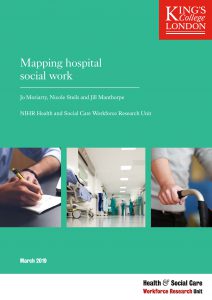Jo Moriarty, Senior Research Fellow at the NIHR Health & Social Care Workforce Research Unit, King’s College London introduces the new hospital social work report, which she wrote with Dr Nicole Steils and Prof Jill Manthorpe. World Social Work Day is on 19 March 2019 #WSWD2019 is the official hashtag. (602 words)
 The theme for next week’s World Social Work Day is ‘promoting the importance of human relationships.’ In preparation for this we are launching our report into hospital social work, which was funded by the National Institute for Health Research Policy Research Programme at the request of the Chief Social Worker for Adults, Lyn Romeo. Lyn has also kindly written the report’s foreword.
The theme for next week’s World Social Work Day is ‘promoting the importance of human relationships.’ In preparation for this we are launching our report into hospital social work, which was funded by the National Institute for Health Research Policy Research Programme at the request of the Chief Social Worker for Adults, Lyn Romeo. Lyn has also kindly written the report’s foreword.
The origins of hospital social work lie in the decision made by the Royal Free Hospital in 1895 to appoint Mary Stewart as the first ‘lady almoner’. Her role was to interview people to decide who would be eligible for the free medical treatment that the hospital provided. Other hospitals soon followed this example and by 1948, the Institute of Almoners had over 1000 active members.[1] Written in the style of the time, Flora Beck’s textbook for almoners noted that their two key tasks were:
… to determine whether social problems are likely to have a bearing on the patient’s illness. The second is to make the patient feel that here is a person with whom he could, if necessary, discuss his personal difficulties; someone to whom he need not mind admitting any trivial misunderstanding which had been bothering him, and to whom he could reveal serious and confidential problems without embarrassment.[2, cited in 3]
As Ingram and Smith point out,[4] relationships have always been central to social work despite periods in which their importance has been downplayed. We sifted through the full texts of over 450 books, journal articles, reports and websites to compile our review and, despite the material coming from countries with very different health and welfare systems, the importance of relationships to hospital social work was a recurring theme.
Every health care system is under increasing pressure to achieve speedier discharges and avoid expensive unnecessary hospital admissions. So how can social workers achieve good relationship based practice in this context? A small, but increasing body of evidence[5-7] highlights the ways in which social workers can quickly build rapport, focus on what is most important to the patient or service user, and provide accurate information about sources of practical help and support.
There is an international trend to shorten hospital stays and avoid unnecessary and expensive readmissions. A good example of where relationships made a key difference was a transitional care programme aimed at helping older people at increased risk for poor outcomes in the transition from hospital to home.[8] This included things like having multiple long term conditions, a history of falls, and having three or more hospital admissions within the past year. In this study, social workers acted as navigators supporting people who had been discharged for periods ranging from 30-120 days. Rounding up to whole numbers, on average, they visited people at home around three times and made four telephone calls. They arranged services in discussion with people and their families and checked that these services were operating as planned. While it cost approximately $204,311 per year to provide this service, the annual cost savings amounted to $628,202.
Another way of thinking of human relationships in social work is to think about interprofessional working. Social workers often feel that their role in multidisciplinary teams is poorly understood and undervalued. However, when asked about social workers, other professionals often describe them as the ‘glue’ or the linchpin of the multidisciplinary team,[9] able to resolve some of the most complex situations.[10]
Our report notes the lack of recent research into hospital social work in England and, in consultation with others, we have made a set of recommendations that we hope will begin to remedy this gap.
Jo Moriarty is Senior Research Fellow at the NIHR Health & Social Care Workforce Research Unit, King’s College London.
Read the report | Project page
References
- Gosling, G.C., Gender, money and professional identity: medical social work and the coming of the British National Health Service. Women’s History Review, 2018. 27(2): p. 310-328.
- Beck, I.F., The Almoner: a brief account of medical social service in Great Britain. 1948, Council of the Institute of Almoners: London.
- Gosling, G., Campbell, Payment and Philanthropy in British Healthcare, 1918–48. 2017, Manchester: Manchester University Press.
- Ingram, R. and M. Smith, Relationship-based practice: emergent themes in social work literature. INSIGHT 41. 2018, IRISS (Institute for Research and Innovation in Social Services): Glasgow.
- Gibbons, J. and D. Plath, Single session social work in hospitals. Australian & New Zealand Journal of Family Therapy, 2013. 33(1): p. 39-53.
- Keast, K., A toolkit for single-session groups in acute care settings. Social Work in Health Care, 2012. 51(8): p. 710-724.
- Sulman, J., D. Savage, and S. Way, Retooling social work practice for high volume, short stay. Social Work in Health Care, 2002. 34(3/4): p. 315-332.
- Watkins, L., C. Hall, and D. Kring, Hospital to home: a transition program for frail older adults. Professional Case Management, 2012. 17(3): p. 117-123.
- Heenan, D. and D. Birrell Hospital-based social work: challenges at the interface between health and social care. British Journal of Social Work, 2018. DOI: https://doi.org/10.1093/bjsw/bcy114.
- Sims-Gould, J., et al., “When things are really complicated, we call the social worker”: post-hip-fracture care transitions for older people. Health & Social Work, 2015. 40(4): p. 257-265.